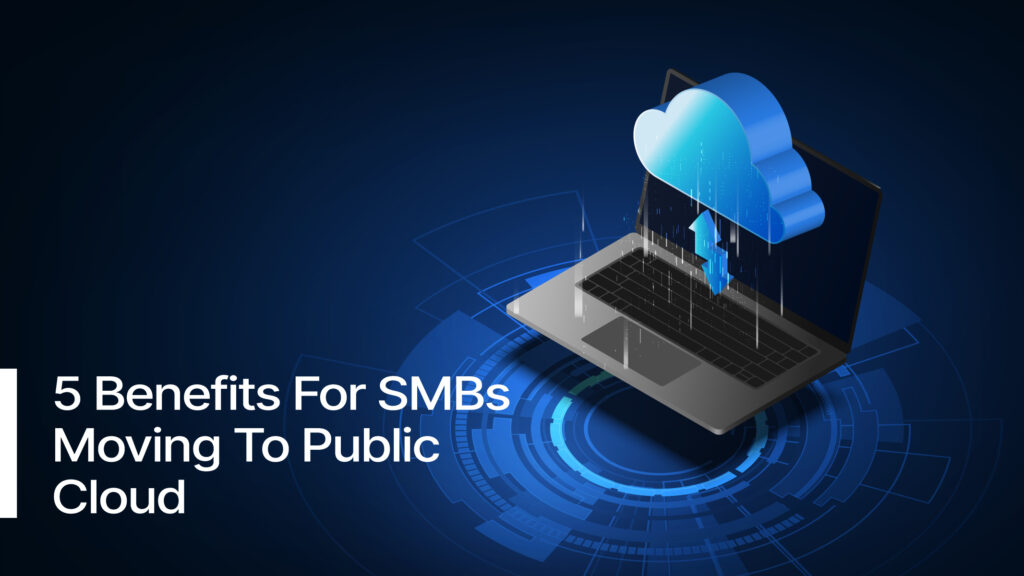
Small and medium-sized businesses (SMBs) are prioritising cost savings, efficiency, agility, and scalability when building their technology platforms. As a result, many businesses and IT leaders are opting to Moving to Public Cloud providers. Cloud computing offers an affordable and strategic solution for SMBs to meet their rapidly evolving computing needs. Public cloud providers leverage the internet to provide on-demand access to resources like storage, servers, and computing power. If you’re considering shifting your business to the public cloud, the following are the key points you need to consider.
5 Benefits For SMBs Moving To Public Cloud

1. Save Money with the Public Cloud

One of the most significant advantages of moving to the public cloud is cost savings. SMBs can reduce their IT infrastructure costs by moving their applications and data to the cloud. Traditional on-premises IT infrastructure requires substantial hardware, software, and maintenance investments, which can be prohibitive for small businesses with limited budgets. In contrast, the public cloud allows SMBs to pay only for the resources they use on a pay-as-you-go basis without needing upfront capital expenses.
Moreover, the public cloud eliminates the need for costly hardware upgrades and maintenance, shifting these responsibilities to the cloud service provider. SMBs can also benefit from economies of scale, as cloud providers can offer discounted rates for their services due to their large customer base. This allows SMBs to access enterprise-grade IT infrastructure and services at a fraction of the cost, enabling them to invest in other areas of their business.
2. Simplify Software Management

Hosting applications on the public cloud eliminates the need for extensive management requirements. In the past, adopting a new software platform involved purchasing licenses, acquiring hardware, managing the installation, and dealing with data migration and security concerns. This process was time-consuming and required regular updates.
Adopting Software as a Service (SaaS) models becomes easier with public cloud computing. The cloud provider manages applications hosted on the public cloud, which handles upgrades and updates. This reduces the workload for your IT team, allowing them to focus on higher strategic priorities. Your organisation can always access the latest software features and patches without worrying about managing them in-house. This streamlined approach lets your business stay current with software advancements while optimising your IT team’s time and resources.
3. Increase Ability to Innovate

Innovation is crucial for SMBs to stay ahead of the competition and drive business growth. The public cloud provides SMBs with the tools and resources needed to foster innovation. With its scalability and flexibility, the cloud allows SMBs to quickly create and test new environments without requiring extensive upfront investments. Cloud-based technologies such as machine learning, artificial intelligence, and big data analytics provide SMBs with insights, automation, and data-driven decision-making capabilities to optimise their business operations. The ability to rapidly deploy and scale resources in the cloud allows SMBs to experiment, iterate, and innovate faster, giving them a competitive edge in the market.
4. Enhance Mobile Capabilities
Cloud computing is a game-changer for small and medium-sized businesses (SMBs), offering cost-effective access to applications, data, and connectivity. With public cloud solutions, SMBs can simplify software management, as the cloud provider handles upgrades and updates, freeing up IT teams for strategic tasks. Moreover, moving to the public cloud enhances mobility, allowing employees to access critical information and work efficiently from anywhere. This flexibility increases agility, enabling SMBs to innovate and respond to changing business needs. Additionally, the reliability and uptime of public cloud providers ensure smooth operations and improved productivity for SMBs, making it a compelling choice for SMBs to optimise their technology platforms.
5. Meet Reliability and Uptime Targets

Downtime and data loss can have severe consequences for SMBs, including lost revenue, damaged reputation, and decreased customer trust. The public cloud offers robust reliability and uptime features that can help SMBs meet their business continuity and disaster recovery requirements. Cloud providers typically have redundant data centers in multiple geographic locations, automated data backups, and data replication across different servers to ensure data durability and availability. Additionally, cloud providers offer service level agreements (SLAs) that guarantee a certain level of uptime and performance, providing SMBs with peace of mind and assurance that their critical business operations will remain uninterrupted.
In conclusion,
Moving to the public cloud offers numerous benefits for small and medium businesses. It enables cost savings, simplifies software management, increases agility and scalability, enhances mobile capabilities, and meets reliability and uptime targets. By leveraging cloud-based services, such as those provided by PatternBots, organisations can optimise their IT resources, streamline software management, and stay current with the latest advancements. With PatternBots, your business can harness the power of the public cloud to meet your evolving computing needs cost-effectively and strategically, enabling you to focus on your core business goals and drive innovation.
Related Blog –